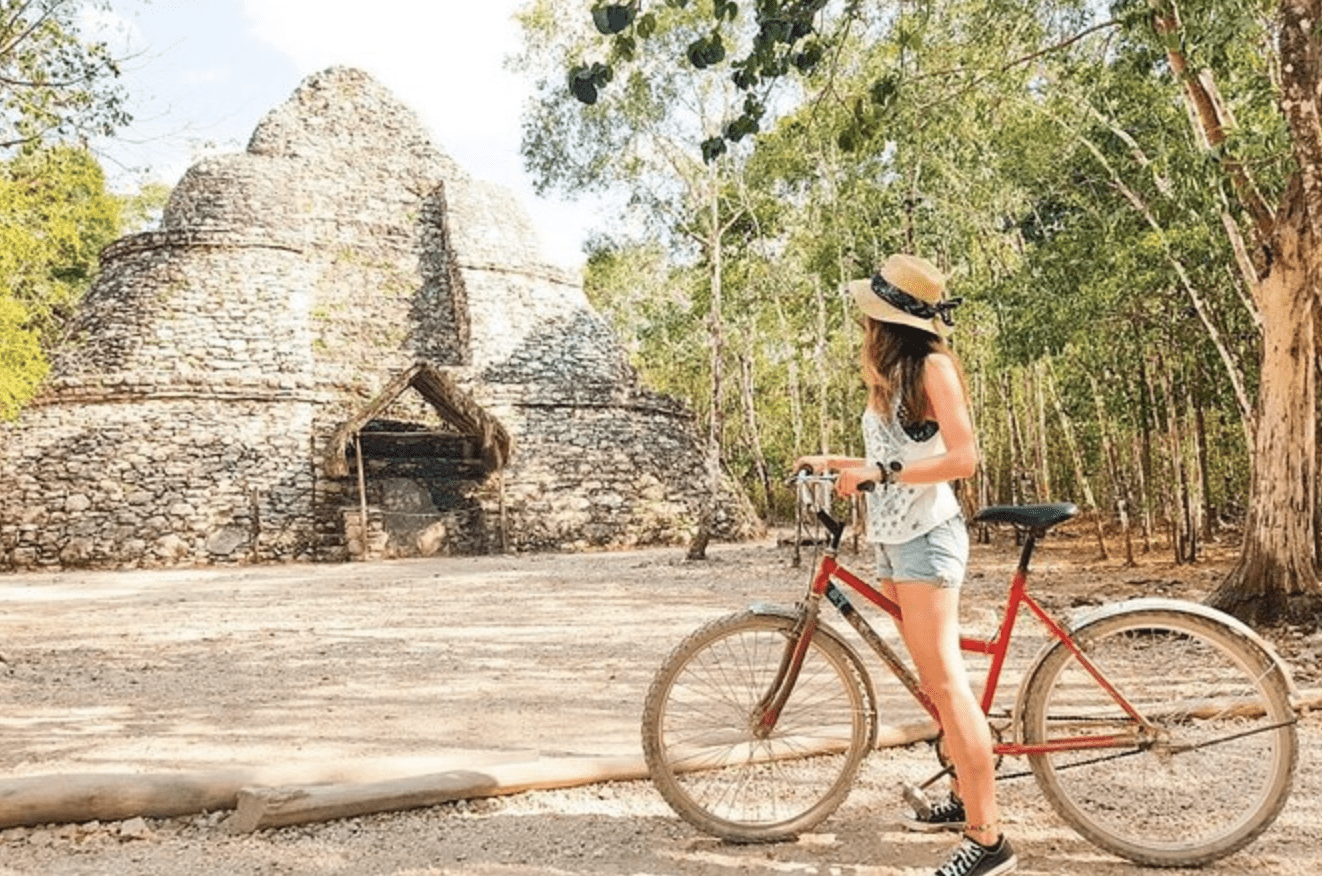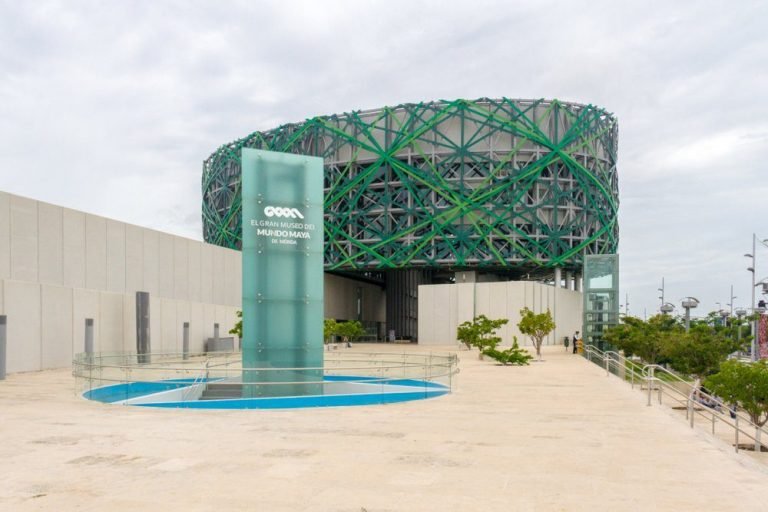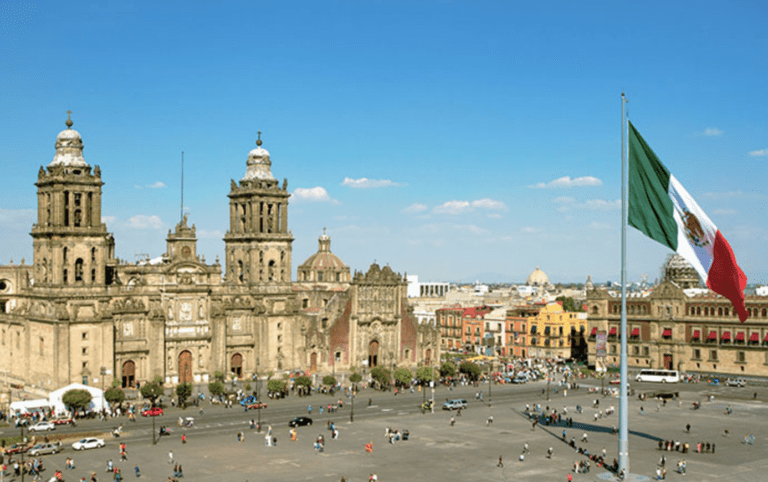Eco-friendly Mexico: Responsible Travel

In today’s rapidly changing world, where environmental concerns have taken center stage, the need for responsible and sustainable travel has never been more critical. As globetrotters and wanderlust seekers, we find ourselves increasingly drawn to destinations that not only offer breathtaking natural beauty and cultural richness but also prioritize the well-being of the planet. Mexico, with its diverse landscapes, rich history, and vibrant culture, stands as an enticing choice for travelers. However, beneath its tourist-friendly facade lies a pressing call to action – the call for eco-friendly responsibility. Why Eco-Friendly Responsibility Matters : For travelers planning to explore the captivating landscapes of Mexico, understanding the importance of eco-friendly responsibility is paramount. Mexico, like many other countries, faces a range of environmental challenges, including deforestation, pollution, and the impact of climate change. These issues not only affect the country’s unique ecosystems but also have far-reaching consequences for its people and future generations.
By choosing to travel responsibly and sustainably in Mexico, you can make a positive impact on the environment and local communities. It’s about more than just enjoying your vacation; it’s about leaving a destination better than you found it. In this article, we will delve into various aspects of eco-friendly travel in Mexico, providing you with insights, tips, and resources to help you make informed choices and contribute to the preservation of Mexico’s natural wonders and cultural heritage.
So, whether you’re planning a trip to the lush jungles, pristine beaches, or ancient ruins of Mexico, join us in this exploration of eco-friendly responsibility and discover how you can be a mindful traveler in one of the world’s most captivating destinations. Embrace the beauty of Mexico while leaving behind a legacy of responsible travel that future generations can continue to enjoy.
Environmental Challenges
Sensitizing to Environmental Challenges in Mexico:
As you embark on your journey to explore the diverse and captivating landscapes of Mexico, it’s crucial to start with an understanding of the pressing environmental challenges that this country faces. By being aware of these challenges, you can travel more responsibly and make choices that support the preservation of Mexico’s natural beauty and cultural heritage.
Environmental Challenges in Mexico
Deforestation: One of the most significant environmental issues in Mexico is deforestation. Vast areas of lush forests, including those in the Chiapas region, are under threat from illegal logging, agricultural expansion, and urban development. The consequences of deforestation are far-reaching, affecting not only the diverse ecosystems but also contributing to carbon emissions and disrupting habitats for iconic species like the monarch butterflies.
Pollution: Mexico’s rapid industrialization and urbanization have led to significant levels of air and water pollution in many regions. Mexico City, for example, often grapples with air quality issues. Pollution not only harms the environment but also poses health risks to local communities.
Climate Change: Like the rest of the world, Mexico is experiencing the effects of climate change. Rising temperatures, changing rainfall patterns, and more frequent and severe weather events pose challenges to both the environment and society. Coastal erosion and increased hurricane activity threaten coastal regions and cultural heritage sites.
Biodiversity Loss: Mexico is renowned for its incredible biodiversity, making it one of the world’s megadiverse countries. However, this biodiversity is under threat due to habitat destruction and the illegal trade of wildlife and plants. Protecting Mexico’s unique species is not only essential for the nation but also for global conservation efforts.
Water Scarcity: Certain regions in Mexico grapple with water scarcity issues, exacerbated by factors such as over-extraction, inefficient water use, and the effects of climate change. Travelers should be mindful of their water consumption to support local communities facing water challenges.
Why Understanding These Challenges Matters
Being aware of these environmental challenges is pivotal because it underscores the significance of traveling responsibly and sustainably in Mexico. Travelers have a role to play in minimizing their negative impact on the environment and supporting initiatives aimed at addressing these challenges.
By learning about these issues and taking responsible actions during your travels, you not only contribute to the preservation of Mexico’s natural wonders but also enrich your own travel experience by engaging with the destination more consciously. In the subsequent sections of this article, we’ll explore practical ways in which you can make eco-friendly choices while exploring Mexico’s breathtaking landscapes, vibrant culture, and rich history. Whether you’re an eco-conscious traveler or a curious explorer, this guide will help you navigate Mexico with greater environmental awareness and responsibility.
Responsible Consumption: Supporting Local Communities in Mexico
As you immerse yourself in the vibrant culture and culinary delights of Mexico, it’s essential to extend your commitment to responsible travel into your daily consumption choices. Supporting local businesses, savoring authentic cuisine, and minimizing food waste can have a profound positive impact on both the environment and the communities you encounter during your journey.
Choosing Local Restaurants and Products
Dine Locally : Seek out restaurants and eateries that prioritize locally sourced ingredients. This not only allows you to savor the authentic flavors of Mexico but also supports small-scale farmers and producers. Look for phrases like “farm-to-table” or “producto local” on menus to identify restaurants that prioritize local sourcing.
Street Food Adventures : Mexico is renowned for its street food culture. Embrace the experience and indulge in delicious tacos, tamales, and other street snacks. These small, family-run businesses often rely on tourists’ patronage to sustain their livelihoods.
Mercados : Explore the local markets, known as “mercados,” where you can purchase fresh produce, traditional spices, and artisanal products. Bargain with local vendors and enjoy the vibrant atmosphere while directly supporting the local economy.
Supporting Local Artisans
Artisan Markets : Mexico is a treasure trove of artisanal craftsmanship. Visit artisan markets to discover unique handmade souvenirs such as pottery, textiles, and jewelry. By purchasing directly from artisans, you support their traditional skills and livelihoods.
Fair Trade Awareness : Look for fair trade products and businesses that prioritize ethical production practices and fair wages for workers. These choices empower communities and promote sustainable livelihoods.
Minimizing Food Waste
Order Mindfully : In Mexican restaurants, portion sizes can be generous. Consider sharing dishes or ordering smaller portions to avoid food waste. If you can’t finish your meal, ask for a “para llevar” (takeaway) container to enjoy leftovers later.
Rescue Leftovers : If you find yourself with extra food that you won’t consume, consider donating it to local shelters or individuals in need. Many organizations in Mexico accept food donations to help combat hunger.
Learn About Local Cuisine : Educate yourself about traditional Mexican cuisine and its regional specialties. This knowledge can help you make informed choices and savor the local flavors without overordering.
Final Thoughts on Responsible Consumption
By making conscious choices in your consumption habits, you not only enhance your travel experience but also contribute positively to the well-being of local communities and the environment in Mexico. Responsible consumption is a powerful way to connect with the culture, support sustainable practices, and leave a lasting, positive impact on the places you visit.
In the next sections of this article, we will explore more ways to travel responsibly in Mexico, from eco-friendly transportation options to ethical wildlife encounters. Whether you’re exploring the bustling streets of Mexico City, relaxing on the beaches of Cancún, or wandering through ancient Mayan ruins, remember that your choices as a responsible traveler can make a meaningful difference in preserving Mexico’s natural and cultural heritage.
Ecotourism in Mexico: Exploring Authentic Nature Experiences
In your quest for responsible travel in Mexico, embracing ecotourism offers a unique opportunity to connect with the country’s natural wonders while directly contributing to their preservation. Mexico boasts an array of national parks, natural reserves, and indigenous communities that provide authentic ecotourism experiences. By immersing yourself in these environments, you can foster sustainable practices and support the cultural richness of local communities.
National Parks and Natural Reserves
Sierra Gorda Biosphere Reserve : Located in central Mexico, Sierra Gorda is a haven for biodiversity. Explore lush forests, hike through rugged terrain, and marvel at cascading waterfalls. Visit community-run eco-lodges and take guided tours led by locals who are passionate about conserving their pristine environment.
Sian Ka’an Biosphere Reserve : On the Yucatan Peninsula, Sian Ka’an is a UNESCO World Heritage Site that showcases the beauty of coastal ecosystems. Enjoy boat tours through mangroves, observe diverse birdlife, and learn about Mayan culture and conservation efforts from local guides.
Copper Canyon : Often referred to as Mexico’s Grand Canyon, Copper Canyon offers stunning landscapes in northern Mexico. Opt for ecotourism adventures like hiking, birdwatching, and interacting with indigenous Tarahumara communities who call the canyon home.
Indigenous Communities and Cultural Immersion
Chiapas Highlands : Journey into the Chiapas Highlands to engage with indigenous communities like the Tzotzil and Tzeltal Mayans. Stay in community-run lodges, participate in traditional ceremonies, and purchase handicrafts directly from local artisans, contributing to their livelihoods.
Huatulco’s Coffee Tours : Huatulco, on the Pacific coast, offers coffee tours where you can learn about organic coffee production from Zapotec communities. Sip freshly brewed coffee and purchase beans to support sustainable farming practices.
Eco-Friendly Activities and Tips
Responsible Wildlife Viewing : When engaging in wildlife encounters, choose operators that adhere to ethical practices. For instance, in Baja California, you can go on eco-friendly whale-watching tours where guides prioritize the well-being of marine life.
Leave No Trace : Whether hiking, camping, or exploring, adhere to the “Leave No Trace” principles. Minimize your impact by disposing of waste properly, respecting wildlife, and staying on designated paths.
Local Cuisine : Savor traditional indigenous cuisine, such as mole in Oaxaca or Pibil in the Yucatan, prepared by local communities. This not only supports their culinary heritage but also showcases the importance of biodiversity in Mexican gastronomy.
By partaking in ecotourism experiences and respecting the natural and cultural environments you encounter, you not only contribute to the preservation of Mexico’s unique landscapes but also create meaningful connections with the people who call these places home. In the subsequent sections of this article, we’ll delve into more aspects of responsible travel in Mexico, including eco-friendly transportation and tips for reducing your environmental footprint during your journey. Whether you’re exploring the Mayan ruins of Palenque, birdwatching in the jungles of Veracruz, or stargazing in the deserts of Baja California, embracing ecotourism can turn your Mexican adventure into a transformative and sustainable experience.
Waste Management: Responsible Practices for Your Stay in Mexico
As you explore the diverse landscapes and vibrant cultures of Mexico, it’s essential to extend your commitment to responsible travel to waste management. Promoting recycling and waste reduction not only helps preserve the beauty of the Mexican environment but also supports local communities in their efforts to maintain clean and sustainable destinations.

Responsible Waste Management in Mexico
Recycling Facilities : In larger cities and tourist destinations in Mexico, you’ll find recycling bins and facilities. Make it a habit to separate your recyclables (plastic, glass, paper, and aluminum) from your general waste. When disposing of items, look for labeled recycling bins or ask locals for guidance.
Reduce and Reuse : Minimize waste by opting for products with minimal packaging and choosing reusable items over disposable ones. Carry a refillable water bottle to reduce single-use plastic consumption and consider using cloth bags for shopping to reduce plastic bag usage.
Participate in Beach Cleanups : Many coastal areas in Mexico, such as Cancún and Puerto Vallarta, organize beach cleanup events. Join these initiatives to help keep the beaches pristine and contribute to environmental conservation efforts.
Responsible Disposal
Dispose of Waste Properly : When visiting natural areas, such as national parks or remote beaches, carry your waste with you and dispose of it properly in designated bins. Leaving trash behind harms the environment and wildlife.
Composting: Some eco-lodges and responsible accommodations in Mexico practice composting. If you’re staying in one of these establishments, inquire about composting practices and participate by separating organic waste from other trash.
Supporting Local Initiatives
Community Recycling Programs : Research if the area you’re visiting has community-based recycling programs or cooperatives. Your support can make a meaningful difference in empowering local communities to manage their waste sustainably.
Purchase Recycled Products : Look for products made from recycled materials when shopping for souvenirs. Supporting artisans and businesses that incorporate recycling into their products can help create a demand for sustainable practices.
Educate and Inspire
Share Your Knowledge : Encourage fellow travelers to adopt responsible waste management practices. By setting a positive example and educating others about the importance of waste reduction, you can create a ripple effect of positive change.
By practicing responsible waste management during your stay in Mexico, you not only contribute to the cleanliness and well-being of the destinations you visit but also promote sustainability and environmental consciousness among fellow travelers. In the subsequent sections of this article, we’ll explore additional aspects of responsible travel in Mexico, from eco-friendly transportation options to cultural sensitivity tips. Whether you’re exploring the archaeological wonders of Chichen Itza, hiking in the Copper Canyon, or enjoying the lively streets of Mexico City, responsible waste management is a small but impactful way to ensure a positive and sustainable travel experience.
Legal Measures and Regulations: Navigating Environmental Protection in Mexico
Understanding and adhering to the environmental laws and regulations in Mexico is crucial for responsible travelers. These measures are put in place to safeguard the country’s natural beauty, biodiversity, and cultural heritage. By being informed and compliant, you can contribute to the preservation of Mexico’s unique ecosystems and support conservation efforts.
Environmental Protection Laws in Mexico
Protected Natural Areas : Mexico boasts numerous protected natural areas, including national parks, biosphere reserves, and wildlife sanctuaries. These areas are legally designated to conserve biodiversity and unique ecosystems. When visiting these sites, follow all park rules, stay on designated trails, and refrain from disturbing wildlife.
Endangered Species Protection: Mexico has stringent laws protecting endangered species, such as sea turtles, jaguars, and marine mammals. Do not buy, sell, or trade products made from endangered species, including souvenirs made from turtle shells or animal skins. Support local initiatives that work to conserve these species.
Wildlife Trafficking : Engaging in wildlife trafficking is illegal in Mexico and can result in severe penalties. Do not purchase products derived from illegal wildlife trade, and report any suspicious activities to local authorities or conservation organizations.
Cultural Heritage and Archaeological Sites
Respect Archaeological Sites : Mexico is rich in ancient history, with countless archaeological sites scattered throughout the country. When visiting these sites, obey all regulations, such as not climbing on structures or defacing monuments. Touching or removing artifacts is strictly prohibited.
Support Cultural Preservation : Purchase tickets and permits when required to enter archaeological sites. The revenue generated often goes toward site maintenance and cultural preservation efforts.
Eco-Friendly Activities and Tours
Choose Certified Tour Operators : Seek out tour operators and activities that adhere to environmental and ethical standards. Look for certifications like “Certificación Ambiental Turística” (Environmental Tourism Certification) to ensure your experiences align with responsible practices.
Check Local Regulations : Be aware of local regulations and guidelines related to activities like snorkeling, diving, or hiking in natural areas. These rules are often in place to protect both visitors and the environment.
Final Thoughts on Legal Measures and Regulations
As a responsible traveler in Mexico, your actions can make a significant difference in preserving the country’s natural and cultural heritage. By understanding and respecting environmental protection laws and regulations, you not only avoid legal issues but also contribute to the sustainability and long-term conservation of Mexico’s diverse ecosystems and rich history.
In the following sections of this article, we will explore additional aspects of responsible travel in Mexico, including eco-friendly transportation options and tips for cultural sensitivity. Whether you’re exploring the ancient ruins of Teotihuacan, venturing into the jungles of Palenque, or indulging in the local cuisine of Oaxaca, your commitment to following legal measures and regulations is a fundamental part of ensuring a positive and responsible travel experience.

Responsible Travel in Mexico: Inspiring Stories and Useful Resources
Stories of Responsible Travelers
One of the most powerful ways to inspire and educate others about responsible travel in Mexico is by sharing the real-life experiences and insights of travelers who have embraced eco-friendly practices. Here are a few firsthand accounts and valuable advice from responsible travelers:
Isabel’s Sea Turtle Adventure in Mazatlán:
- Isabel, an eco-conscious traveler, shared her incredible experience volunteering with a local sea turtle conservation organization in Mazatlán. She recounted the thrill of releasing hatchlings into the sea under the guidance of dedicated conservationists. Isabel emphasized how such hands-on experiences not only create lasting memories but also directly contribute to protecting these endangered creatures.
Javier’s Cultural Immersion in Chiapas:
- Javier, an avid explorer, recounted his journey into the heart of the Chiapas Highlands, where he lived with indigenous communities and participated in their daily activities. He stressed the importance of respecting local customs and traditions while sharing how these immersive experiences deepened his understanding of the region’s rich cultural heritage.
Lena’s Eco-Friendly Transport Discovery:
- Lena, a sustainability enthusiast, shared her discovery of eco-friendly transportation options in Mexico. She highlighted the convenience and environmental benefits of using bicycle-sharing programs in Mexico City and the joy of exploring the city at a slower, more sustainable pace.
Ressources Utiles : Helpful Resources for Eco-Friendly Travelers
For travelers seeking more information and guidance on responsible and eco-friendly travel in Mexico, here are some valuable resources:
-
National Commission of Natural Protected Areas (CONANP): Website
- CONANP provides information about Mexico’s protected natural areas, including maps, regulations, and visitor guidelines. It’s an essential resource for understanding how to explore these areas responsibly.
-
Mexican Environmental Agencies :
- Familiarize yourself with environmental agencies such as SEMARNAT (Secretaría de Medio Ambiente y Recursos Naturales) and PROFEPA (Procuraduría Federal de Protección al Ambiente). These government bodies play a key role in environmental protection and enforcement of regulations.
-
Mexican Association for Responsible Tourism : Website
- AMTR is a valuable resource for travelers interested in responsible tourism practices in Mexico. They offer insights, guides, and recommendations for eco-friendly travel experiences.
-
Ecotourism Certification :
- Look for ecotourism certifications and labels when booking tours and accommodations. These certifications, such as “Certificación Ambiental Turística,” indicate that a business meets specific environmental and sustainability standards.
-
Local Tourism Offices :
- When visiting different regions in Mexico, reach out to local tourism offices or information centers. They can provide maps, brochures, and advice on responsible activities and attractions in the area.
By tapping into these resources and learning from the experiences of responsible travelers, you can make informed decisions and contribute to the growing movement of eco-friendly travel in Mexico. Whether you’re exploring the cenotes of the Yucatan Peninsula, hiking in the Sierra Madre Mountains, or participating in community-based tourism initiatives, these insights and organizations will guide you toward a fulfilling and sustainable travel adventure in Mexico.
Conclusion and Call to Action:
In concluding this exploration of responsible travel in Mexico, it is imperative to remember that every choice we make as travelers, no matter how small, has an impact on the environment and local communities. Mexico, with its cultural richness and unique biodiversity, is a destination deserving of our respect and preservation.
The significance of traveling responsibly in Mexico lies in safeguarding the natural, cultural, and historical treasures of this magnificent country. By embracing eco-friendly practices, supporting local initiatives, and adhering to environmental regulations, we can contribute to ensuring that these wonders remain intact for future generations.
As you plan your next journey to Mexico, I strongly urge you to put into practice the insights and knowledge shared in this article. Choose to support local communities, minimize your environmental footprint, and actively engage in the preservation of this extraordinary country.
Whether you are exploring the lush jungles of Chiapas, diving into the crystal-clear waters of the Riviera Maya, or strolling through the vibrant streets of Oaxaca, remember that your travel can be much more than a personal adventure. It can be a valuable contribution to the protection of Mexico’s natural and cultural heritage.
Together, as responsible travelers, we have the power to preserve the beauty and diversity of this remarkable land. So, embark on your journey through Mexico, experience authenticity, and become stewards of its splendor. By adopting eco-friendly and sustainable practices, we can all play an active role in preserving this gem of Latin America for generations to come. Let your journey become a story of respect, discovery, and conservation.

Sandra Leutmann, a distinguished international travel expert, holds a diploma from the University of Bremen. With over two decades of experience, she has traversed the globe, enriching her insights into diverse cultures and destinations. Sandra’s expertise is sought after by travelers and industry professionals alike, as she crafts bespoke itineraries that promise authentic and memorable experiences. She was a keynote speaker at the TTG Travel experience conference in Rimini and the WTM in London.






